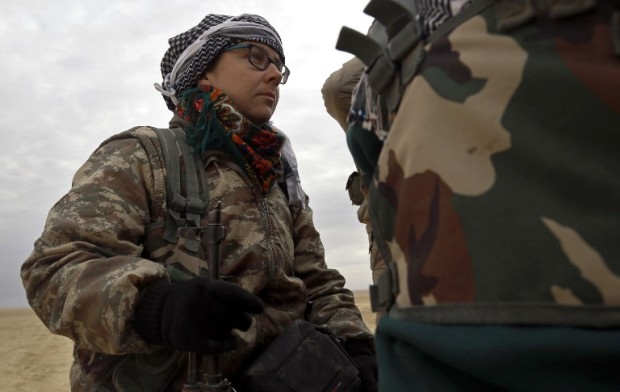Fight IS, start ‘revolution’: Why foreigners join Syria Kurds

Kimmy Taylor, a 27-year-old British citizen who joined the Kurdish People’s Protection Units (YPG), talks with her comrades near Khunayz on the northern outskirts of Raqa on March 5, 2017. Captivated by the idea of fighting jihadists, or dedicated to starting a “revolution,” foreigners have diverse reasons for joining the YPG in northern Syria. The group is the key component of the US-backed Syrian Democratic Forces alliance, now advancing on the Islamic State group’s stronghold of Raqa. Photo by AFP.
QAMISHLI, Syria – Captivated by the idea of fighting jihadists, or dedicated to starting a “revolution,” foreigners have diverse reasons for joining the Kurdish People’s Protection Units (YPG) in northern Syria.
The group is the key component of the US-backed Syrian Democratic Forces alliance, now advancing on the Islamic State group’s stronghold of Raqa.
Hundreds of foreign fighters have fought alongside the YPG in Syria, of whom at least 25 have been killed, the Syrian Observatory for Human Rights monitor says.
Kimmy
Kimmy Taylor, a 27-year-old British citizen, travelled to northern Syria in 2016 to write about women’s rights after studying politics at university in Sweden.
She had planned a 10-day visit but, after just three days, she decided to stay.
Kimmy says she fell in love with the system of “autonomous administration” Kurdish authorities have implemented across northern Syria, describing it as “an answer to everything that I’ve seen wrong with the world”.
“I thought, why am I reading books in Sweden about politics when I can live in a revolution?” she tells AFP excitedly, a checkered black-and-white scarf wrapped around her head.
Kimmy has taken courses in the Kurdish language, “the ideology of democratic confederalism” and military affairs with the YPG’s female arm, the YPJ.
“After I was on the front line for some months, I joined the YPJ media team and now we’re in Raqa” province, she says, describing her daily routine of taking, editing, and publishing photos of the battle.
She says witnessing IS lose Raqa city “would be a dream”.
“Maybe this hasn’t happened in history before — that normal people have… created a people’s army and defeated a group that is like Daesh. It’s incredible,” she says, using an Arabic acronym for the group.
Although she misses her family, friends, and good chocolate, Kimmy has no plans to leave: “I know if I return to Europe, I’ll be bored after one week.”
Firas
Firas Vancouver, 23, was working as a correctional officer in a high-security prison in Victoria, Canada when he started learning about the YPG.
“It was a tough job, you see kind of the dark side of humanity,” Vancouver says.
“One of the main factors of me coming here, getting on a plane and joining the revolution, was seeing the struggle through internet, on TV, on the news,” he adds.
Sporting short spiky hair and some stubble, Vancouver says he emailed the YPG directly, who responded encouraging him to travel to northern Syria.
“It was probably less than a month from when I sent the first email that I was on a plane to start my journey,” says Vancouver.
He says he hopes the presence of foreigners alongside the Kurdish fighters will force Western governments to pay attention and provide “more support for Rojava and the struggle here with YPG and YPJ”.
Rojava is the Kurdish name for Kurdish-majority parts of northern Syria.
“We weren’t forced to come here. We volunteered to come here. And the Kurdish people — you can tell — they see that and show us a lot of love,” he says.
Roger
At 20, Roger Benjamin — now known as Jakdar Kawa, or Fighter Kawa in Kurdish — is one of the youngest known foreign fighters.
His thick curly black hair swept up in a voluminous do, Roger tells AFP there are three reasons he left the United States a month ago for northern Syria.
“Number one, any kind of medical help I can give. I have some kind of experience with that. Number two, fight IS, cause seriously they’re very bad people,” he says.
“And number three, just to see what direct democracy is like. If you look around at the village, the people, the culture, whatnot. Take it in. I want to see how it works, this political system.”
He speaks quickly, hitting his fist into his hand for emphasis: “So far, they’re really pounding it in about ideology and language. They really want us to assimilate to the culture, to get to know the Kurdish people, who they are, the YPG.”
Benjamin says he admires YPG fighters killed in battle because “they’re dying fighting for what they believe in”.
“If there’s any way I could die, it would be that.”
Maxime
Maxime, a French citizen, is in northern Syria for his second stint with the YPG.
The 27-year-old fought alongside the group in 2015 in Tal Abyad, near the Turkish border, but broke up with his girlfriend in December to return for a longer stay.
“If I have to stay a year, two years, three, or even 10, I will stay for 10 years to support this revolution and help people,” he says.
The YPG facilitated his entry into Syrian territory, where he joined the International Freedom Battalion, a unit of foreign fighters.
“We’re not here to impose our ideas, whatever they are, but the people are asking for us to liberate them,” he says.
“We will liberate them and try to establish a more humane system.”














